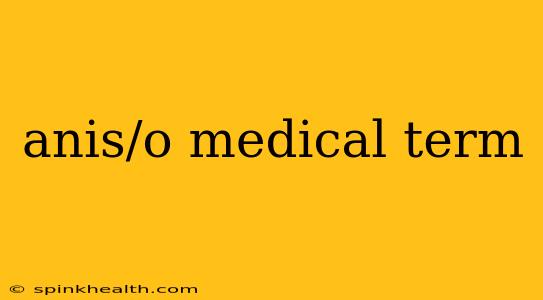The medical prefix "anis/o" holds a significant place in medical terminology, often appearing in words that describe conditions or qualities characterized by inequality or unevenness. Understanding its meaning is key to interpreting a wide array of medical terms. Let's embark on a journey to unravel the mysteries surrounding this crucial prefix.
What Does Anis/o Mean?
Imagine a perfectly symmetrical object, and then picture it slightly distorted, with one side different from the other. That's the essence of "anis/o." This prefix, derived from the Greek word "anisos," meaning "unequal," signifies a lack of uniformity or symmetry. It points to a difference or disparity in size, shape, density, or other measurable qualities.
Our exploration won't be confined to a simple definition. We'll delve into the applications of "anis/o" in various medical contexts and address some frequently asked questions. The story of "anis/o" is not just about a word; it's about understanding the intricacies of medical conditions and diagnoses.
How Is Anis/o Used in Medical Terms?
The prefix "anis/o" combines with other word roots to create specific medical terms. Let's consider a few examples:
-
Anisocoria: This term describes the condition where the pupils of the eyes are unequal in size. One pupil might be noticeably larger than the other. The cause can range from benign factors to neurological issues, highlighting the importance of proper medical evaluation.
-
Anisocytosis: This refers to the variation in the size of red blood cells. Healthy blood exhibits a relatively uniform red blood cell size. Anisocytosis, often detected through blood tests, can be a sign of various underlying health conditions, from anemia to bone marrow disorders.
-
Anisotropy: This term, less commonly used in everyday medical conversation but crucial in specific fields like radiology and cardiology, refers to the property of exhibiting different characteristics depending on the direction. For instance, a tissue might exhibit different densities when viewed from different angles on a medical scan.
Frequently Asked Questions about Anis/o
Let's address some common questions surrounding the "anis/o" prefix:
What are some other medical terms that use the prefix "anis/o"?
While anisocoria, anisocytosis, and anisotropy are frequently encountered, there are other less common but equally significant terms. For instance, "anisomastia" refers to unequal breast size, and "aniseikonia" describes a condition where the images seen by each eye differ in size. The possibilities are broader than those typically discussed. This highlights the versatility of the prefix.
Can anis/o indicate a serious medical condition?
The presence of "anis/o" in a medical term doesn't automatically signal a serious condition. However, it indicates an irregularity that requires further investigation. The significance of the finding depends heavily on the context and the specific term it is part of. For instance, mild anisocoria might be inconsequential, while anisocytosis in a blood test could indicate a severe underlying condition.
How is anis/o diagnosed?
Diagnosis varies depending on the specific term incorporating "anis/o." For anisocoria, a simple visual examination by a doctor is sufficient. Anisocytosis is usually detected through a complete blood count (CBC). Other conditions might require more advanced imaging techniques like X-rays or MRIs.
Is there a treatment for conditions involving anis/o?
Treatment depends entirely on the underlying cause of the inequality. In some cases, such as mild anisocoria, no treatment might be necessary. However, conditions involving significant anisocytosis or other abnormalities requiring intervention often need specific medical treatments to address the root cause.
In conclusion, understanding the medical prefix "anis/o" is essential for deciphering a wide range of medical terms that describe conditions of inequality or unevenness. While the presence of "anis/o" doesn't automatically imply a serious condition, it always warrants further investigation to determine the underlying cause and appropriate management. It is crucial to consult a healthcare professional for any concerns about specific medical terms containing "anis/o."

